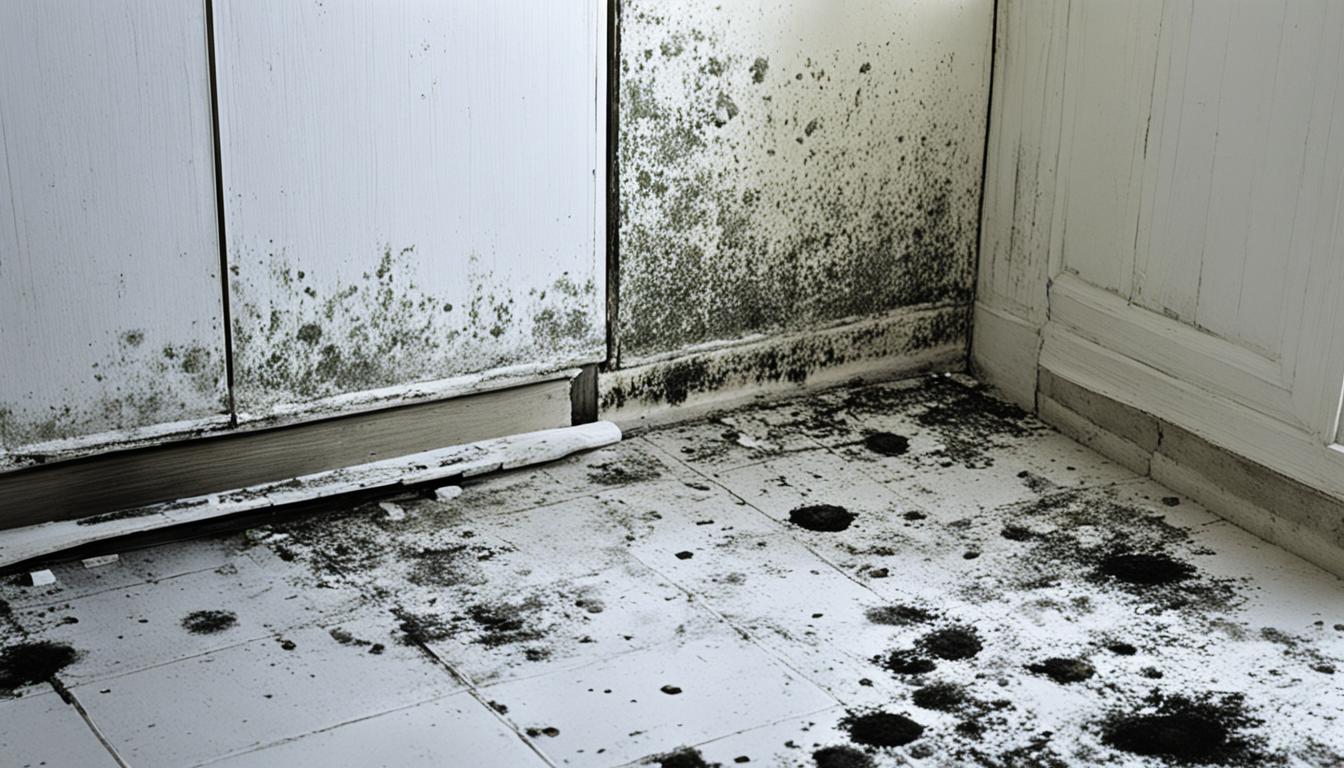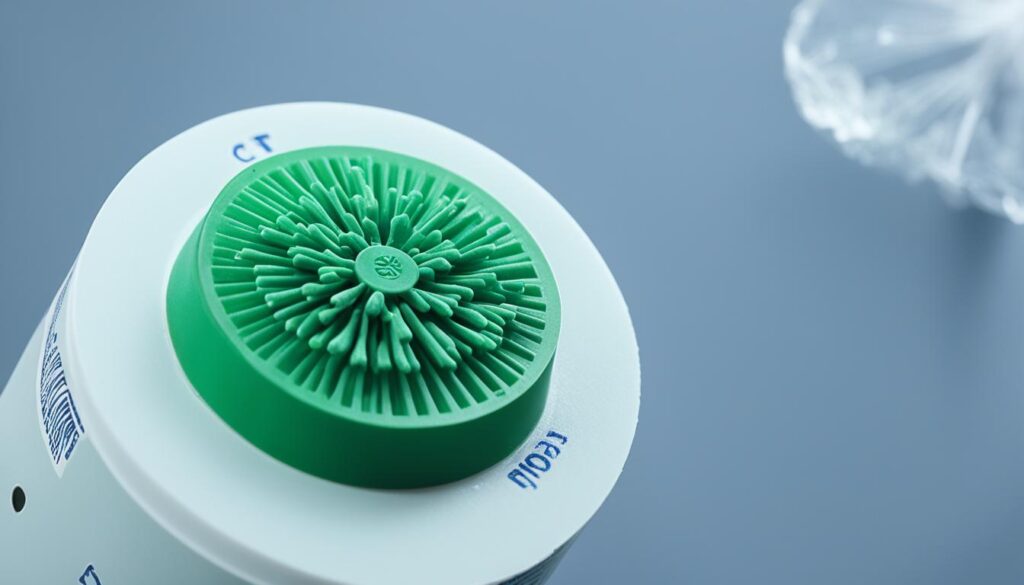
Mold Symptoms: Recognize Early Signs and Risks
Recognizing mold symptoms early is crucial for maintaining a healthy living environment. Mold can pose significant risks to both your property and your health. By understanding the signs of mold infestation and the associated risks, you can take proactive steps to prevent further damage and protect yourself and your loved ones.
Mold symptoms can vary depending on the individual and the type of mold present. It’s essential to be aware of the common signs that indicate a potential mold problem. Early recognition can make a significant difference in minimizing the harmful effects and potential health issues associated with mold exposure.
In this section, we will explore the importance of recognizing mold symptoms early and understanding the associated risks. By being aware of the signs, you can take necessary steps for prevention and protect your health.
Key Takeaways:
- Recognizing mold symptoms early is crucial for prevention and health protection.
- Mold symptoms can vary depending on the individual and type of mold.
- Early recognition of mold symptoms can minimize the harmful effects and potential health issues.
- Understanding the signs of mold infestation helps in taking proactive measures for prevention.
- Contact Fix Mold Miami at 305-465-6653 for professional mold assessments and assistance.
Common Mold Symptoms to Watch Out For
Identifying common mold symptoms is crucial for early detection. By recognizing these signs of mold exposure, you can take appropriate action to address any potential mold issues.
Mold, a type of fungus, can grow indoors and outdoors, thriving in damp and humid environments. When mold spores are present in the air, they can cause a variety of health problems for individuals who are exposed to them. It’s important to be vigilant for the following common mold symptoms:
- Allergies: If you experience allergy-like symptoms such as sneezing, itchy or watery eyes, runny nose, or a persistent cough, mold exposure could be the culprit.
- Respiratory Issues: Mold can irritate the respiratory system, leading to symptoms such as difficulty breathing, wheezing, chest tightness, and frequent respiratory infections.
- Skin Irritation: Some individuals may develop skin rashes, hives, or other forms of dermatitis after coming into contact with mold.
- Headaches and Fatigue: Exposure to mold can trigger persistent headaches and unexplained fatigue.
- Brain Fog: In some cases, mold exposure can cause cognitive difficulties, including difficulty concentrating, memory problems, and confusion.
If you notice these symptoms recurring or worsening when you are at home or in specific environments, it’s essential to investigate for potential mold growth. Early detection and remediation are key to preventing further exposure and protecting your health.
“Recognizing the signs of mold exposure is critical. Being aware of common mold symptoms allows individuals to take prompt action, which can significantly improve outcomes. Early intervention is key to preventing further health complications.” – Dr. Samantha Reed, Allergist
Keep in mind that not everyone reacts to mold in the same way, and the severity of symptoms can vary. If you suspect mold but are unsure, consulting with a professional mold inspector or healthcare provider is recommended.
Next, we will explore the health risks associated with mold exposure and how it can impact your well-being.
| Mold Symptoms | Signs of Mold Exposure |
|---|---|
| Allergies | Allergy-like symptoms such as sneezing, itchy or watery eyes, runny nose, or a persistent cough |
| Respiratory Issues | Difficulty breathing, wheezing, chest tightness, and frequent respiratory infections |
| Skin Irritation | Skin rashes, hives, or other forms of dermatitis |
| Headaches and Fatigue | Persistent headaches and unexplained fatigue |
| Brain Fog | Difficulty concentrating, memory problems, and confusion |
Health Risks Associated with Mold Exposure
Mold exposure can have detrimental effects on your health. It is important to understand the potential risks associated with mold exposure, as this knowledge can help you prioritize prevention and remediation efforts. The following are the key health consequences that can be caused by mold:
- Respiratory Problems: Mold spores can irritate the respiratory system, leading to a range of issues such as coughing, wheezing, and shortness of breath. Individuals with pre-existing respiratory conditions like asthma may experience worsened symptoms in the presence of mold.
- Allergic Reactions: Mold exposure can trigger allergic reactions in sensitive individuals. Symptoms may include sneezing, itching, runny nose, and watery eyes. These allergic reactions can be particularly troublesome for those with allergies or compromised immune systems.
- Other Health Issues: Prolonged exposure to mold can also contribute to other health problems, including skin irritation, headaches, fatigue, and sinus infections. Individuals with weakened immune systems, such as the elderly or those undergoing medical treatments, may be especially susceptible to these issues.
Recognizing the potential health risks associated with mold exposure is crucial for taking swift action to protect yourself and your loved ones. By implementing effective mold prevention and remediation strategies, you can safeguard your well-being and create a healthier living environment.

“Understanding the potential health consequences associated with mold exposure is the first step in addressing this issue. By being aware of the risks, individuals can take proactive measures to prevent mold growth and protect their respiratory health.”
Prevention and Remediation Steps for Mold
Taking proactive measures to prevent mold growth is crucial. By following these effective steps for mold prevention, you can create a healthy living environment for you and your loved ones.
1. Ensure Proper Ventilation
One of the key steps in mold prevention is to ensure proper ventilation throughout your home. Good airflow helps in keeping moisture levels low, reducing the chances of mold growth. Make sure to open windows, use exhaust fans in bathrooms and kitchens, and maintain proper air circulation.
2. Control Humidity Levels
Mold thrives in damp environments, so it’s important to control humidity levels in your home. Use a dehumidifier in areas prone to excess moisture, such as basements and bathrooms. Keep indoor humidity below 50% to discourage mold growth.
3. Repair Water Leaks Promptly
Water leaks provide favorable conditions for mold growth. Inspect your home regularly for any signs of water leakage, such as damp walls, ceilings, or musty odors. Promptly repair any leaks to prevent mold from taking hold.
4. Clean and Dry Wet Areas
Quickly clean and dry any wet areas in your home, such as after a spill or flooding. Mold can begin to grow within 24-48 hours in moist conditions, so it’s essential to address wetness promptly.
5. Perform Regular Inspections
Regularly inspect your home for any signs of mold, such as visible growth or musty odors. Pay close attention to areas prone to moisture, such as bathrooms, basements, and attics. If you spot any mold, take immediate action to remediate the problem.
Remember, prevention is always better than remediation. By implementing these proactive measures, you can significantly reduce the risk of mold growth and the need for extensive remediation.
However, if you do find mold in your home, it’s crucial to address the issue promptly. Mold remediation involves thorough cleaning, removal of affected materials, and addressing the underlying moisture problem. For extensive mold growth or if you’re unsure about handling the remediation yourself, it’s best to consult a professional mold remediation service.
Ensuring mold prevention and taking swift action for remediation will help keep your home healthy and safe for everyone. By being proactive and following these steps, you can protect your property and the well-being of your family.

Conclusion
Recognizing mold symptoms early is crucial for maintaining a healthy living environment. Mold exposure can lead to various health risks like respiratory problems and allergies, which can significantly impact your well-being. By understanding the signs and risks associated with mold exposure, you can take proactive measures to protect yourself and your loved ones.
Implementing effective prevention and remediation measures is essential in preventing mold growth and addressing existing mold issues. Proper ventilation, controlling humidity levels, and regular inspections are key steps in mold prevention. If you suspect mold in your home or office, it is advisable to seek professional assistance.
Contact Fix Mold Miami at 305-465-6653 for expert mold assessments and assistance. Our experienced team can help identify and address mold problems, ensuring a safe and healthy environment for you and your family. Don’t compromise on your well-being – take action against mold today!




